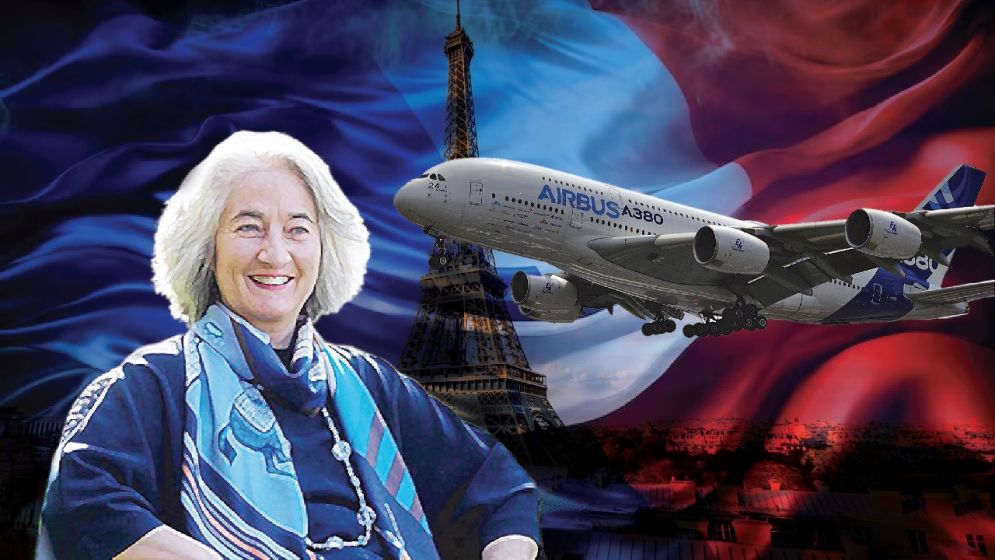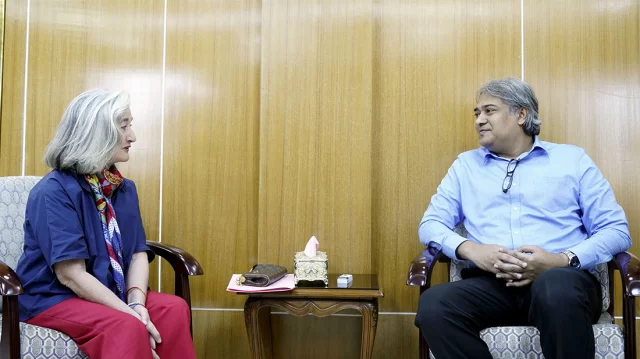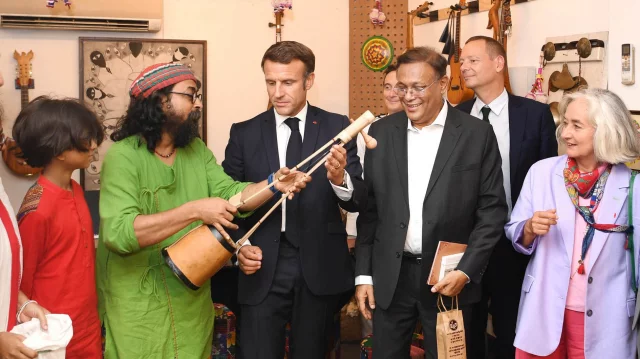Arafat, the French connection, and the "troubled" legacy of an ambassador

In mid-August, rumors began circulating on social media that Mohammad A Arafat, the former state minister for Information, was hiding in the French embassy.
By then, close aides of the former Premier Sheikh Hasina, such as Salman F Rahman and Anisul Huq, had been arrested under notably humiliating conditions.
Arafat had been a prominent figure during Hasina’s fourth term, which commenced earlier this year following an election without opposition.
Known for his eloquence and boldness, Arafat conveyed information with the confident assurance of an academic. While some viewed his statements as accurate, others considered them misleading—an issue that remains a matter of debate.
It's however clear that Arafat gained significant attention as the Information Minister during the July revolution and was giving interviews to major news outlets like Al Jazeera, and even took center stage during Hasina's highly publicized meeting with businessmen.
In this meeting, he made controversial remarks, suggesting some of the student protesters may have been "drugged" and repeatedly claiming the entire protest was orchestrated by Jamaat-Shibir.
These actions understandably led to grievances against Arafat from both students and the general public.
So, when news spread about Arafat seeking refuge in the French embassy, some student groups even considered organizing protests around the embassy, which is also shared with Germany.
They recognized this action might negatively impact Bangladesh's international image, but felt it was necessary to express their dissatisfaction.
The French embassy issued a statement on X (formerly Twitter) denying that they had offered refuge to Arafat. Despite this, a new rumor emerged claiming that Arafat was hiding in the residence of French Ambassador to Bangladesh Marie Masdupuy.

The French connection
There was no way to verify this claim, and the fervor among protesters to seize the ambassador’s residence eventually diminished.
Arafat has not been arrested, despite widespread media reports suggesting otherwise. My interest was less in Arafat's whereabouts and more in why his alleged hiding place was associated with the French embassy among all the embassies in Dhaka.
There’s a reason behind this association. Arafat played a crucial role in orchestrating French President Emmanuel Macron’s highly publicized visit in September of last year. This visit was particularly significant for the Hasina regime, which was facing intense pressure from the Western world, led by the US, to conduct a free and fair election in Bangladesh.
In this context, a visit from the leader of one of the five permanent members of the UN Security Council would undoubtedly create a favorable optic for Hasina’s autocratic government, allowing it to proceed with another one-sided election.
Beneath the surface of Macron’s carefully staged visit—complete with a boat ride, a music session with a folk singer, a rickshaw-ride in Old Dhaka and a warm bear-hug like embrace with Hasina—lay the signing of a billion-dollar Airbus deal, which was advantageous for both governments.
But how can I be certain that Arafat was the key figure behind Macron's visit? Because, I learned it straight from the horse's mouth.
I was working with a French journalist before the last national election, and we interviewed Arafat. During a casual moment of that interview, Arafat, somewhat boastfully, claimed that he had personally arranged Macron’s visit to Bangladesh, bypassing the Ministry of Foreign Affairs.
I later verified this claim with at least two people from the Foreign Ministry, and the French journalist can also attest to Arafat’s statement.
The focus of my article isn’t on Arafat, Macron, the visit, or the controversial Airbus deal. Instead, it’s about something else entirely. To quote Jay-Z: “Don’t tell me what was said about me. Tell me why they were so comfortable saying it to you.”

What intrigues me is not merely what Arafat and Hasina’s other associates might have done, but why embassies, such as that of France, create circumstances where a rumor like "Arafat hiding in the French embassy" gains significant traction on social media.
I believe Marie Masdupuy, the French ambassador with salt-and-pepper hair and a lively smile, bears significant responsibility for the "tainted" reputation of the French Embassy in Dhaka.
The “problematic” ambassador
Masdupuy, a seasoned diplomat, took up her post in Dhaka in January of last year. Her career includes various roles at the French Foreign Ministry headquarters and diplomatic assignments in Kuwait, Russia, Afghanistan, and Egypt.
Since her arrival in Dhaka, the French ambassador has become notably aligned with Hasina’s overtly authoritarian regime.
Her support and defense of several Awami League actions, both in physical settings and on social media, have been perceived by many as backing for an autocratic government.
Shortly after her posting, in February 2023, the Bangladesh chapter of the Media Freedom Coalition (MFC)—a platform of 51 countries dedicated to promoting media freedom—issued a statement expressing serious concern over the Hasina government’s decision to revoke the publication authorization for the Dainik Dinkal newspaper.
While most major MFC member countries signed the statement, France, under Masdupuy, did not.
Later, in a meeting with some journalists, including myself, Masdupuy casually dismissed Dainik Dinkal as anything but a newspaper and mentioned that she didn’t want to damage her reputation by signing the statement.
This meeting, held in her elegantly decorated Dhaka apartment, featured her usual lively demeanor. She offered us poor coffee and some of the best butter cookies I’ve ever had. Throughout our nearly hour-long conversation, she casually smoked twice—an apparent French habit, we guessed—demonstrating a relaxed attitude towards serious issues.

Perhaps Masdupuy was handling serious issues with a misplaced sense of breeziness. In her embassy’s diplomatic programs, she repeatedly invited law enforcement officials sanctioned by the United States for human rights violations—a practice not followed by other Western embassies in Dhaka.
Several diplomats from other embassies I spoke with had little praise for her, describing her stance toward the Hasina regime as “problematic.” One diplomat was blunt: “She [Masdupuy] was a cheerleader for an autocracy.”
Masdupuy, however, maintained that her role was to advance her country’s strategic partnership with Bangladesh, framing her actions as a facilitation of that objective.
On July 11 of this year, just five days before the Monsoon Revolution that would eventually topple Hasina, Masdupuy commented during the French National Day celebrations that “Many experts and journalists want to think it’s all for purely commercial reasons, and are eager to mention the so-called Airbus deals and other trade perspectives. Of course, they are wrong and biased by our competitors,” as reported by Dhaka Tribune.
She added that France’s desire to strengthen its relationship with Bangladesh was based on the belief that the country plays a crucial role in regional stability within the Indo-Pacific region.
Following Hasina’s fall and subsequent departure, Masdupuy is now seen meeting with officials from the Yunus-led government. As the ambassador of one of the world’s most influential nations, she has the privilege to engage with whomever she chooses in Bangladesh.
However, France—a country with a longstanding amicable relationship with Bangladesh—needs to recognize that their ambassador, despite her prestigious honors like the Knight of the National Order of Merit and the Knight of the Legion of Honor, has left behind a tarnished legacy.
This is not a favorable image for a nation that prides itself on promoting democratic values.
—

